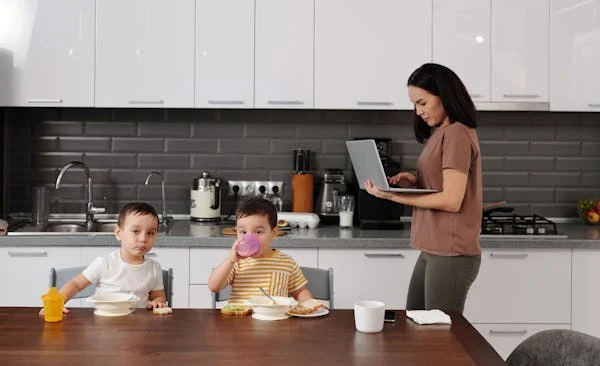
As parents, chances are you’ve had days (or weeks… or months) where you’ve felt like you’re running on empty. Maybe you’ve found yourself daydreaming about a deserted island where the only sounds are ocean waves and definitely not “Mom! Dad! Watch this!” on repeat. Well, my friend, welcome to the club. Parenting burnout is real, and it’s more common than that “picture-perfect” family on your Instagram feed would have you believe.
Let’s face it: parenting is tough. It’s a 24/7 job with no instruction manual, no sick days, and sometimes, what feels like very little appreciation. Add in the pressures of work, maintaining a household, and trying to have some semblance of a personal life, and it’s no wonder we sometimes feel like we’re one spilled sippy cup away from a total meltdown.
But here’s the good news: you’re not alone, and there are ways to break free from the burnout cycle. As a mom who’s been through the wringer (and lived to tell the tale), I’m here to share 10 powerful strategies that have helped me and countless other parents reclaim their sanity and joy in parenting. These aren’t just feel-good platitudes or impossible-to-implement advice. These are real, practical strategies that you can start using today to turn things around.
1. Embrace the Power of ‘Good Enough.’

Remember when you first became a parent and you swore you’d make all organic, home-cooked meals, keep a spotless house, and never let your kid watch TV? Yeah, how’s that working out for you? If you’re laughing (or crying) right now, it’s time to introduce yourself to your new best friend: “Good Enough.”
Here’s the truth:
Perfectionism is the enemy of happy parenting. It’s like trying to run a marathon in high heels – painful, impractical, and likely to end in tears. The pursuit of being the “perfect parent” is not only exhausting, it’s downright impossible.
So, what does embracing “Good Enough” look like? It means letting go of unrealistic expectations and focusing on what really matters. Did your kids eat something vaguely nutritious today? Win. Did you manage to get everyone out of the house with clothes on (even if they don’t match)? Victory dance time. Did you show your kids love, even if you also showed them your frustration? You’re doing great.
One mom I know used to stress about having Pinterest-worthy birthday parties for her kids. She’d spend weeks planning, crafting, and baking, only to end up exhausted and snappy on the actual day. One year, she decided to embrace “Good Enough.” She ordered pizza, bought a cake from the store, and set up a simple backyard obstacle course with stuff she had around the house. The result? The kids had a blast, and Sarah actually enjoyed the party instead of collapsing in tears afterwards.
Remember, your kids don’t need a perfect parent. They need a present parent. And you can’t be present if you’re constantly stressing about being perfect. So repeat after me: “I am a good enough parent, and that is more than enough.”
2. Set Boundaries Like Your Sanity Depends on It (Because It Does)

If you’re anything like I used to be, the word “boundaries” might make you feel a little uncomfortable. After all, aren’t good parents supposed to be available 24/7, ready to meet every need at a moment’s notice? Spoiler alert: Nope!
Setting boundaries isn’t selfish; it’s essential for your wellbeing and, by extension, your family’s wellbeing. Think of it like the oxygen mask principle on airplanes: you need to put on your own mask first before you can help others. In the same way, you need to take care of your own mental and emotional health to be the best parent you can be.
So, what kind of boundaries are we talking about? It could be as simple as establishing a daily “quiet time” where everyone in the family spends 30 minutes doing a calm, independent activity. Or it might mean learning to say “no” to extra commitments that stretch you too thin. For working parents, it could involve setting clear work hours and sticking to them, rather than constantly being “on call” for both work and family.
Remember, boundaries aren’t walls—they’re fences with gates. You’re not cutting yourself off; you’re creating a healthy structure that allows you to give your best to both your family and yourself.
3. Find Your Tribe (And Don’t Be Afraid to Lean on Them)

Remember the old saying, “It takes a village to raise a child”? Well, in our modern, often isolated lives, we sometimes forget that we’re not meant to do this parenting gig alone. Finding and nurturing your “tribe”—those fellow parents who get your struggles and celebrate your wins—can be a game-changer in battling burnout.
Your tribe might be other parents at your kids’ school, neighbors, church members, or even an online community of like-minded parents. The key is to find people who support you without judgment, who can offer a listening ear, a helping hand, or just a much-needed laugh when you’re at your wit’s end.
I’ll never forget the day I finally broke down and admitted to my mom’s group that I was struggling. I expected judgment. Instead, I got a chorus of “Me too!” and “You’re not alone!” It was like a weight lifted off my shoulders. Suddenly, I wasn’t failing at parenting; I was just experiencing a universal challenge.
But finding your tribe is only half the battle. The other half? Actually leaning on them. This means being vulnerable enough to ask for help when you need it. Can’t make it to soccer practice? Ask another parent if they can take your kid. Feeling overwhelmed? See if a friend can watch the kids for an hour while you take a breather.
Remember, accepting help doesn’t make you a bad parent. It makes you a smart one. And chances are, the parents you help will be more than happy to return the favor when you need it.
4. Prioritize Self-Care (And No, It’s Not Selfish)

Okay, I can almost hear the collective eyeroll at the mention of “self-care.” In a world where we’re constantly told to hustle harder and sleep when we’re dead, the idea of taking time for ourselves can seem… well, selfish. But here’s the truth: Self-care isn’t selfish. It’s necessary.
Think about it this way: You wouldn’t expect your phone to run without recharging it, right? So why do we expect ourselves to keep going and going without taking time to recharge our own batteries?
Now, before you start picturing day-long spa retreats or expensive vacations, let me clarify: Self-care doesn’t have to be time-consuming or costly. It’s about finding small, consistent ways to nurture your physical, emotional, and mental health.
For me, self-care looks like waking up 20 minutes before my kids to enjoy a quiet cup of coffee and some devotional time. For you, it might be a quick workout, a hobby you enjoy, or even just taking an uninterrupted shower (yes, that counts!).
Self-care isn’t about escaping your responsibilities. It’s about taking care of yourself so you can show up as the best version of yourself for your family. So go ahead and put that oxygen mask on first. Your kids will thank you for it.
5. Practice Mindfulness (Even in the Chaos)

When you’re in the thick of parenting, with a to-do list a mile long and kids who seem to have an endless supply of energy (and questions! ), the idea of being “mindful” might seem laughable. But hear me out: Mindfulness isn’t about achieving some zen-like state of perfect calm. It’s about being present in the moment, whatever that moment might bring.
Practicing mindfulness as a parent is about finding small moments throughout your day to center yourself and focus on the present.
Here are a few simple ways to incorporate mindfulness into your parenting:
- Take three deep breaths before responding to a stressful situation (like your kids fighting… again).
- Really focus on the sensations when hugging your child—their warmth, the smell of their hair, the sound of their breathing.
- When doing a routine task like washing dishes, pay attention to the feel of the water, the smell of the soap, and the sound of the dishes clinking.
The beauty of mindfulness is that it helps you appreciate the good moments more fully and navigate the challenging ones with more grace. It’s not about eliminating stress (because, let’s face it, that’s impossible in parenting), but about changing your relationship with stress.
6. Redefine Success (It’s Not About Being Supermom or Superdad)

In a world of carefully curated social media feeds and Pinterest-perfect parenting, it’s easy to fall into the trap of thinking that successful parenting looks like always-happy kids, a spotless house, and a parent who manages to do it all with a smile. But let me let you in on a little secret: That’s not real life. And chasing that impossible standard is a sure-fire route to burnout.
It’s time to redefine what success looks like in your parenting journey. And here’s the kicker: You get to decide what that looks like for your family. Maybe success is having meaningful conversations with your kids, even if it means the laundry piles up sometimes. Perhaps it’s prioritizing family dinner most nights, even if you’re serving takeout on paper plates.
Here’s an exercise that can help: Write down your top 5 priorities as a parent. Not what you think they should be, but what truly matters most to you. Then, measure your success against those priorities, not someone else’s highlight reel.
The most important measure of your success as a parent isn’t how clean your house is or how many activities your kids are enrolled in. It’s the relationship you’re building with your children and the values you’re instilling in them.
7. Embrace Routines (But Stay Flexible)

If you’re rolling your eyes at the mention of routines, thinking, “Yeah, right, like anything is predictable with kids,” I hear you. But stick with me here, because establishing some basic routines can be a game-changer when it comes to reducing stress and preventing burnout.
Routines provide structure and predictability, which can help both you and your kids feel more grounded and secure. They can reduce decision fatigue (because, let’s face it, parents make about a million decisions a day) and help your days flow more smoothly.
Now, I’m not talking about scheduling every minute of your day. That’s a recipe for frustration. Instead, think about creating loose routines around the most chaotic times of day—mornings, mealtimes, and bedtimes are good places to start.
For example, a simple bedtime routine might look like this: Bath, pajamas, brush teeth, story time, lights out. When kids know what to expect, they’re often more cooperative (notice I said “more cooperative,” not “always cooperative”—we’re aiming for progress, not perfection here!).
But here’s the important part: While routines are helpful, flexibility is key. Life happens. Kids get sick, plans change, and unexpected events pop up. The goal is to have a framework that guides your day, not a rigid schedule that becomes another source of stress when things go off track.
Routines are tools to serve you and your family, not strict rules to make you feel like a failure when life gets messy (because it will). Use them when they help, and let them go when they don’t.
8. Be Grateful (Even on the Tough Days)

I know, I know. When you’re knee-deep in dirty diapers, sibling squabbles, or teenage attitude, “gratitude” might be the last thing on your mind. But hear me out, because this simple practice can be transformative in battling parental burnout.
Gratitude isn’t about ignoring the hard stuff or pretending everything is perfect. It’s about intentionally noticing and appreciating the good, even when it’s surrounded by challenges. And here’s the thing: The more you practice gratitude, the more you start to notice those positive moments.
So how do you cultivate gratitude in the chaos of parenting? Start small. Try to identify three things you’re grateful for each day. They don’t have to be big things. Maybe it’s your child’s laugh, a moment of quiet while they’re napping, or the fact that you managed to drink your coffee while it was still hot (parenting win!).
Practicing gratitude doesn’t mean you can’t acknowledge the hard parts of parenting. It’s not about toxic positivity or denying your struggles. It’s about widening your perspective to include the joyful moments alongside the challenging ones.
And here’s a bonus: When you model gratitude, you’re teaching your kids a valuable skill that can boost their resilience and happiness throughout their lives. So go ahead and start noticing those small moments of joy. Your future, less-burned-out self will thank you.
9. Learn to Say No (And Yes to What Really Matters)

In the world of parenting, it can sometimes feel like “no” is a bad word. We want to give our kids every opportunity, be there for every event, and volunteer for every committee. But here’s the truth: Saying yes to everything is a fast track to burnout city.
Learning to say no is not about being negative or unhelpful. It’s about being intentional with your time and energy so you can say a wholehearted yes to what truly matters. It’s about quality over quantity.
Start by getting clear on your priorities (remember that exercise from strategy #6?). When an opportunity or request comes up, ask yourself: Does this align with my top priorities? Will saying yes to this mean saying no to something more important?
Saying no can feel uncomfortable at first, especially if you’re a people-pleaser. But remember, every time you say no to something that’s not essential, you’re saying yes to your wellbeing and your family’s needs. And that’s nothing to feel guilty about.
Pro tip: You don’t have to give a long explanation when you say no. A simple “Thank you for thinking of me, but I can’t commit to that right now” is perfectly acceptable. Your time and energy are precious resources; it’s okay to guard them carefully.
10. Celebrate the Small Wins (Because Parenting is Full of Them!)

In the daily grind of parenting, it’s easy to focus on what’s going wrong. The tantrum in the grocery store, the struggle to get homework done, the toys that seem to multiply on the living room floor no matter how many times you clean up. But here’s a little secret that can make a big difference in battling burnout: Start celebrating the small wins.
Now, when I say “celebrate,” I don’t mean you need to throw a party every time your kid puts their plate in the dishwasher (although, hey, if you want to, go for it!). It’s about consciously acknowledging and appreciating the little victories that happen every day.
Did your toddler put on their own shoes? Win! Did your teenager remember to text you when they arrived at their friend’s house? Victory! Did you manage to fold a load of laundry while simultaneously helping with math homework? You’re basically a superhero!
Celebrating small wins serves two important purposes. First, it helps you notice the progress you and your kids are making, even when it feels like you’re stuck in the same old routines. Second, it trains your brain to look for the positive, which can be a powerful antidote to the negative thinking that often fuels burnout.
So, how can you start celebrating those small wins? Here are a few ideas:
- Keep a “wins” journal where you jot down one positive thing from each day.
- Share your daily win with your partner or a friend—bonus points if you celebrate each other’s wins too!
- Create a family “brag board” where everyone can post their accomplishments, no matter how small.
- Take a moment to mentally high-five yourself when you navigate a challenging parenting moment with grace.
Remember, parenting is a marathon, not a sprint. It’s the accumulation of these small, daily wins that shapes our children and our experience as parents. By celebrating these moments, we remind ourselves that even on the toughest days, we’re making progress and doing a pretty darn good job.
Wrapping It Up: Your Burnout-Busting Action Plan
Well, we’ve explored ten powerful strategies to help you break free from the burnout cycle and rediscover the joy in parenting. But I know what you might be thinking: “This all sounds great, but where do I start?”
First, take a deep breath. Remember, overcoming burnout is a journey, not a destination. You don’t have to implement all these strategies at once. In fact, trying to do so would probably lead to… you guessed it, more burnout!
Instead, I encourage you to choose one or two strategies that resonate with you the most. Maybe it’s setting better boundaries, or perhaps it’s cultivating a gratitude practice. Whatever speaks to you, start there.
Here’s a simple action plan to get you started:
- Reflect: Take a few minutes to think about which areas of parenting are causing you the most stress right now.
- Choose: Pick one strategy from this list that you think could help address that stress.
- Plan: Decide on one small, concrete step you can take to implement that strategy this week.
- Act: Put your plan into action, even if it feels imperfect or awkward at first.
- Reflect again: At the end of the week, think about what worked and what didn’t. Adjust as needed.
Remember, the goal isn’t to become a perfect, burnout-proof parent overnight (spoiler alert: there’s no such thing!). The goal is to gradually build habits and mindsets that help you navigate the challenges of parenting with more resilience and joy.
And here’s one last thing I want you to remember: You’re doing a great job. Really. Parenting is hard, and the fact that you’re here, reading this, shows that you care deeply about being the best parent you can be. That caring? It matters more than you know.
So, dear fellow parent, as you go forth to tackle bedtimes and homework battles and sibling squabbles, remember this: You’ve got this. And on the days when you don’t? That’s okay too. Take a deep breath, refer back to these strategies, and remember that tomorrow is a new day, full of new opportunities to grow, learn, and love.






